|
Peter
Collinson - The Director
Date of birth: 1st April 1936 Lincolnshire,
England. Died 16th December 1980 Los Angeles.
(cancer)
Peter Collinson was born into a theatrical
family in Cleethorpes, Lincolnshire. Following
his parents' divorce, he lived briefly
with his grandmother before being sent
to the Actors' Orphanage in Chertsey,
Surrey. There he appeared in a number
of plays, coming to the notice of the
Orphanage's President, Nöel Coward,
who watched over the young Collinson's
career, even becoming his Godfather, arranging
an audition at RADA and his first job
as a stage-hand at the New Cross Empire.
Collinson brought a TV commercial-maker's
eye to feature films and won attention,
if not critical approval, with his first
three films. The Penthouse (1967), dealing
with rape, and The Long Day's Dying (1968),
an intimate but muddy and messy war film,
raised a certain amount of controversy,
as did Up the Junction (1968), for different
reasons as it broadened and coarsened
a unique TV original.
Then Collinson went on to make The italian
Job with a budget of just $3m, which was
his most successful commercial film, although
he did at just 44 years of age and never
got to see The Italian Job grow into the
much loved and cult film that it is today.
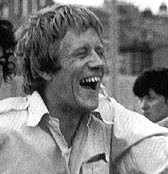
Peter Collinson
on set |
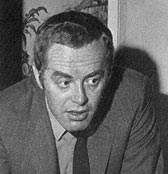
Producer Michael
Deeley |
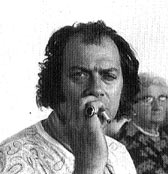
Production
Designer
Disley Jones |
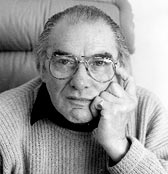
2nd Unit Director
Phillip Wrestler |
A
Colourful Cast
With Caine already on board, thanks to
writer Troy Martin Kennedy, it was Peter
Collinson who persuaded Noel Coward out
of self imposed exile to act in what to
was become his last ever film. Coward
was pretty frail and needed the support
of partner Graham Payn, who became Bridger's
sidekick Keats in the film. Payn would
help Coward out with everything from negotiating
steps to prompting him when he forgot
his lines. Many of Cowards original lines
had to be re-worked so that they were
shorter, the great man couldn't remember
lengthy dialogues. Despite this fragility,
his wit was as sharp as ever and would
have the cast and crew in fits of giggles
with his well timed quips on the set.
Coward was paid a flat fee of £25k
for his ten days of work which was filmed
in Ireland.
Producer Michael Deeley wanted some well
known faces in the film, so had small
parts written in, even though this was
not in troy Martin Kennedy's original
script. So Deeley and casting director
Paul Lee Lander found cameo roles for
Fred Emney, Benny Hill and Irene Handl,
all well known British artists at the
time.
When it came to search for two Italian
actors, the choices were obvious, as there
was only a handful of well know and respected
Italian actors at that time. Raf Vallone
was cast as the Mafia boss, Altabani.
Raf had worked on many Italian films and
was a natural. The professional footballer-turned-laywer-turned-actor
didn't have a great grasp of the English
language and Collinson was not happy with
the way some of his lines were delivered.
The plan was to dub in the voice whilst
editing the film, but this was avoided
as Raf got the hang of it.
The other Italian actor cast was Rossano
Brazzi, also an actor who had given up
law and his love of sports for a life
in the film industry. Brazzi has been
in hundreds of films, but he'll always
be remembered for his short but vital
role as Roger Beckerman, the man behind
the entire Italian Job.
A
lot of the crew were also having a great
time, many of them hadn't experienced
a properly budgeted film before and everything
was laid on for them, so they made the
most of it.
The colourful John Forgeham who played
Frank(o), was having the time of his life,
most of the time he was half cut and would
deliver his lines drunk!
Many of the crew and actors had an input
and passion for the film. Caine himself
immersed himself in it's production, airing
ideas and suggestions. Derek Ware, who
played Rozzer was involved in the attack
on the bullion van. His company Havoc
provided the stunt work for this and various
other parts of the film. Special effects
man Ken Morris made a cameo appearance
as the footy fan that closed the sewer
gate on the police car. He had in his
hand the control unit that activated the
rig that blew the Alfa out of the sewer!
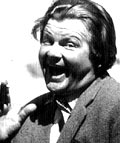
Benny Hill
(Professor Peach) |
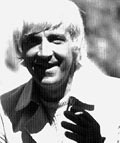
John Forgeham
(Franko) |
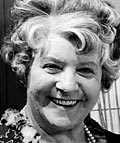
Irene Handl
(Ms. peach) |
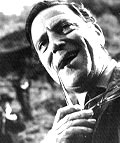
Raf Vallone
(Altabani) |
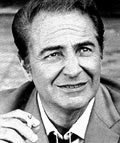
Rossano Brazzi
(Beckerman) |
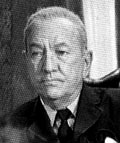
Noël
Coward
(Mr. Bridger) |
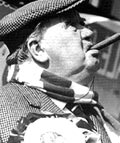
Fred Emney
(Birkinshaw) |
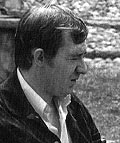
Derek Ware
(Rozzer & Stunt Adviser) |
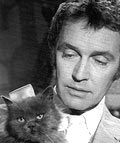
Tony Beckley
(Camp Freddy) |
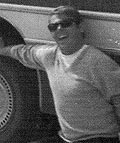
Norman Warwick
(2nd Unit Director of
Photography) |
All
in the Detail
An invaluable and colourful addition to
The Italian Job crew was Disley Jones,
the Production Designer. Disley set the
scenes up with great care and detail,
he was exceptional at his job and everything
had to look right. From the Alpine flowers
on Beckerman's wreath, to making the rooftop
jump scene look like a regular street
scene, and not the top of Fiat's factory,
to the livery on the Chinese plane that
delivered the bullion. He had a great
sense of humour on location and when given
the task of finding suitable extras for
the mafia, he went into prank overdrive.
When rehearsal for the scene where the
mob pops up out of the mountains when
they intercept Charlie and his fast car
team, the 35 mob members popped up and
they were all 'screamers' as Hazel Collinson
put it. Disley had gone around all the
gay clubs in Turin and picked the 'prettiest'
out, and put them in black suits and black
hats, Hazel explained. The crew were in
stitches, rolling around on the set.
Disley worked closely with Phillip Wrestler,
the 2nd Unit Director who was responsible
for most of the filming of the chase scenes.
He was also responsible for the entire
filming of the cliffhanger ending, as
Collinson wasn't happy with the planned
ending and refused to do it! They became
friends again decades after the film was
made in a chance meeting. Sadly Phillip
passed away in 2003. Disley Jones wrote
a touching obituary, which can be read
here.
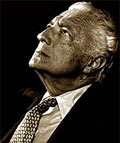
Gianni Agnelli |
Fiat
vs BMC
Much of the films fluidity, and success
was down to the generosity of Italian
car giant Fiat. Producer Michael Deeley
was chatting to his friend, Lord Harlech
about the upcoming film project and Harlech
mentioned that he knew Gianni Agnelli,
who owned Fiat. A phone call was had and
Fiat opened there arms to the entire production
team, which in turn opened up Turin as
Fiat basically ran Turin. The Turin authorities
would try to accommodate the crew wherever
they could. With the Police on board the
chase scene went better than anyone hoped.
The entire crew were amazed at the hospitality
of Fiat, especially as they had been so
bluntly snubbed by BMC. Fiat helped in
any way they could, offering up trucks,
cars, extras, just about anything, even
when their suggestion to use Fiats instead
of Minis was politely rejected, they still
helped out any way they could. As a second
option, Agnelli made sure that there were
plenty of Fiats in the traffic jam scenes,
they're everywhere! Commentators noted
the different approaches between Fiat
and BMC and many weren't shocked when
BMC were in serious financial trouble
in the 70's. (Post Script: This is not
in reference to the recent 2005 MG Rover
Group going into receivership - which
is a great shame - it's ironic that in
The Italian Job the gold was from the
Chinese, and in the end they played their
part in sending MG Rover down the tubes
- another case of life imitating art?!?!)
That
ending...
Some people love it,
some people hate it, but it's one of the
most talked about film endings that there
has ever been. The ending was always in
question, the production didn't ever really
have a proper scripted ending that everyone
agreed on. Many have stated that the ending
was shot like that as there was to be a
sequel, but it's more likely that it came
about as it was the best idea that they
had.
Various ideas were penned, one which was
given some serious thought was to have the
'jobbers' safely get away and place the
bullion in a Swiss bank vault in Geneva.
On leaving the bank Croker would see that
his crew sitting in a nearby cafe didn't
look happy - then he noticed why, Altabani's
mafia were all over the place. Altabani
requested the docket which had the security
code for the bank deposit,
but Charlie burned it. Collinson wasn't
at all happy with this ending either, so
the coach balancing was the final choice.
Still Collinson wasn't happy and had the
2nd unit film the entire scene.
In March 2003 an interview with Michael
Caine was published in The Guardian that
unearthed Caine's understanding of what
was supposed to happen to the coach full
of 'jobbers'...
A
Cinema Cliffhanger Topples
March 5 2003
By Tania Branigan, London
It was cinema's
greatest cliffhanger. But now Michael
Caine has blown the gaff on the ending
of The Italian Job.
More
than three decades after the release
of what has become a cult film, the
star has solved the riddle playing
on the minds of so many fans: what
exactly happened after the credits
rolled as his gang's getaway coach
teetered on a precipice?
"Hang on a minute, lads. I've
got a great idea," Caine's cockney
rogue blurts as the robbers' £4
million haul of gold bullion threatens
to send them over the side of a mountain.
In a BBC television documentary to
celebrate his 70th birthday, the actor
has revealed that the gang were meant
to escape.
"The next thing that happens
is you turn the engine on," he
said. "You all sit exactly where
you are until all the petrol has run
out, which changes the equilibrium.
We all jump out of the bus and the
gold goes over the cliff.
"And at the bottom are the French
mafia, sitting waiting for the gold."
Far from being a masterpiece of suspense,
it emerges that the ending was intended
merely to pave the way for a sequel.
Once the gang has escaped, "we
are off trying to get it back and
that is the next movie", Caine
told the Hollywood Greats documentary,
to be screened next Tuesday. "(The
sequel) was never made because the
film didn't do well in America."
Nevertheless, The Italian Job is seen
as epitomising its era, thanks to
its style, sassiness and jaunty Quincy
Jones soundtrack. The 1969 film, best
known for its cheekily choreographed
Mini Cooper car chase and the line
"You were only supposed to blow
the bloody doors off!" centers
on a heist in Turin.
Caine and his gang organise a huge
traffic jam, snatch the gold and escape
in Minis, only for their bus to veer
off a mountain road as they celebrate
their success. With the back of the
bus hanging over the cliff, the thieves
are on board with a dilemma: the gold
bars have slid to the back of the
bus, but they must stay at the front
to counterbalance the gold and stop
the bus tumbling over the cliff.
Two years ago the film's scriptwriter
Troy Kennedy Martin revealed that
the cast and crew disliked the famous
climax. Director Peter Collinson hated
it so much that he made his assistant
film it, Kennedy Martin said. "I
never thought the film would be iconic;
I don't think Michael did, either.
The reviews weren't that good either,
and of course it didn't have a traditional
ending." Fans
now face the trauma of coping with
a Paramount remake of the film,
with Mark Wahlberg playing Caine's
character, Croker.
-
Guardian
|
| Production
Credits |
|
|
Paramount
An Oakhurst Production |
|
|
Written by: Troy
Kennedy Martin
Director of Photography:
Douglas Slocombe
Production Designer:
Disley Jones
Associate Producer:
Bob Porter
Music: Quincy Jones
Edited by: John Trumper
Production Manager:
Derek Kavanagh
Camera Operator:
Chic Waterson
Art Director: Michael
Knight
Construction Manager:
Terry Apsey
Sound Mixer: John
Aldred
Dubbing Mixer: Gerry
Humphreys
Chief
Make-up Artist: Freddie Williamson
Chiel Hairdresser:
Gordon Bond
Wardrobe Supervisor:
Dulcie Midwinter
Wardrobe Master:
Roy Ponting
|
Lighting: Lee Electric
Special Effects:
Pat Moore/Ken Morris
Casting: Paul Lee
Lander
Costumes: Bermans
Mr Caine's Suits:
Douglas Hayward
Songs
'On Days Like These'
Sung by Matt Monroe
'Getta Bloomin' move on'
Lyrics by Don Black/Music by Quincy
Jones
2nd Unit
2nd Unit Director:
Philip Wrestler
Director of Photography:
Norman Warwick
Camera
Operator: Ronnie Maasz
Assistant Director:
David Monroe |
Italian
Production Supervisor:
Giorgio Miglianni
Italian Assistant Director:
Mauro Sacripanti
Stunt Driving:
L'Equipe Remy Julienne
Processed by: Humphries
Laboratories
Produced by: Michael
Deeley
Directed by: Peter
Collinson
Made in location in Italy, Ireland
and England, and at Isleworth Studios,
London, England, and Twickenham
Studios, London, England.
Filmed in Panavision ® Color
Our grateful thanks to the city
of Turin and to Fiat for their help
with this film. |
|